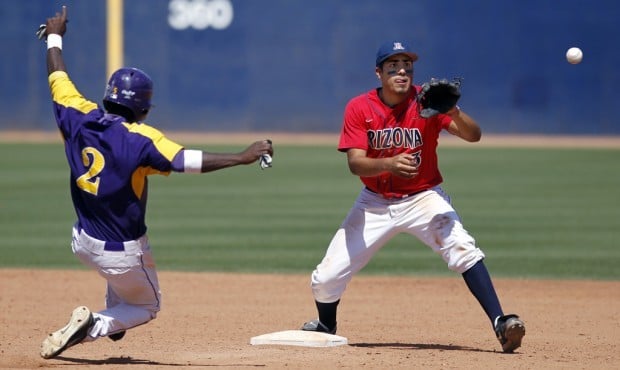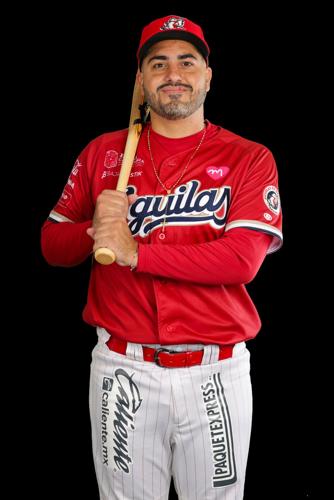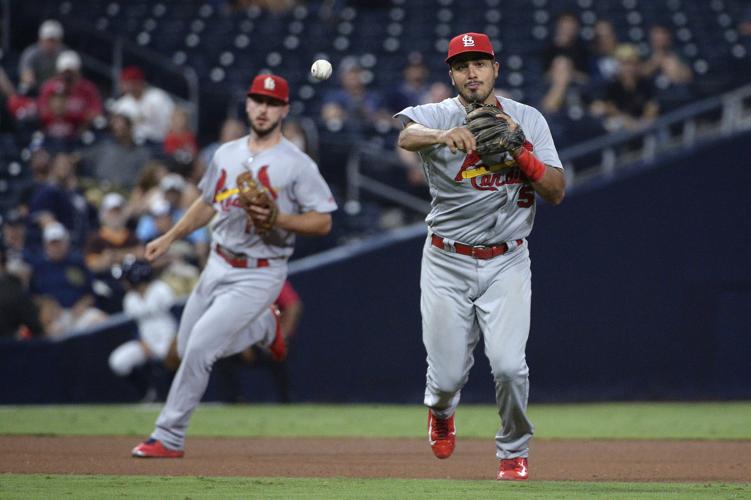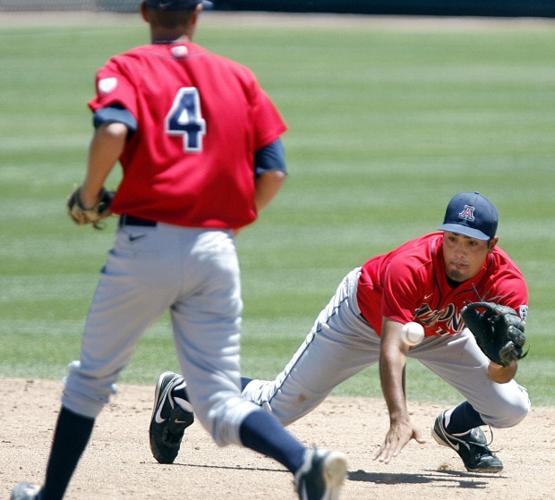Minor-league baseball is a grind. Long bus rides. Low pay. Mounting frustration for the multitudes who don’t make it.
Former Arizona shortstop Alex Mejia lived that life for the better part of seven years. After helping the Wildcats win the College World Series in 2012 — he was the Pac-12 Player of the Year and Defensive Player of the Year — Mejia began his professional baseball career. He played in the St. Louis Cardinals organization from 2012-18. He made it to the majors in 2017, appearing in 29 games.
A little over a year after his final appearance in a Cardinals uniform, Mejia was designated for assignment. He had a fleeting thought that, at age 27, his playing career was over.
Then Mejia got a call from Acereros de Monclava of the Mexican Baseball League. It turned out his professional career was just getting started.
Mejia has been playing pro ball in Mexico for the past six years. His winter-league team is Aguilas de Mexicali, who are facing Yaquis de Obregon in the inaugural Mexican Pacific Winter League International Series this weekend at Kino Veterans Memorial Stadium. Game 3 is slated for 5:05 p.m. Sunday, weather permitting.

Former Arizona shortstop Alex Mejia, right, shown in a game in 2011, helped the Wildcats win the College World Series in 2012. He played in the St. Louis Cardinals organization for seven years before launching a successful second baseball career in Mexico.
Mejia is a Mexican-American who grew up in Sylmar, California. He never expected his baseball journey would take him back to his parents’ home country. Along the way, Mejia has rediscovered something he had lost.
“Being in the minor leagues, it’s tough,” Mejia, 33, said. “Everyone’s all in for themselves, because everybody wants to make it to the major leagues. The team aspect of it is there, but it’s not as prominent. So when I came out here, it actually brought (out) a lot of passion, a lot of love that I had for the game that I had lost.
“It’s more team-oriented. It’s more win-oriented. Obviously, everyone wants to do good for themselves. But at the same time, they focus on winning. They’re more focused on a championship, kind of like what it was in college.”
The Star caught up with Mejia before his return to Tucson for the International Series. Here are some highlights from the conversation, which has been lightly edited.
What do you think made that 2012 UA team special?

Arizona's Alex Mejia, right, fields the ball and makes the out at second base in the fourth inning against St. John's in Game 2 of the 2012 NCAA Super Regionals at Hi Corbett Field. The Wildcats won 7-4 to advance to the College World Series.
A: “I was talking about it with a couple friends that were on the team. We bought into everything that coach (Andy) Lopez was preaching. We put ourselves aside and really bought into the plan and what he created.
“There wasn’t too much ego, you could say. Of course, everybody had a little bit of it, because everyone needs a little bit of it. But we put ourselves aside and bought into that whole thing. And that’s what helped us and led us to where we ended up.”
How did Coach Lopez influence you as a player and person?
A: “Oh man. I could only say good things about him. He just helped shape you as an individual. He demanded so much of you. He demanded accountability. He demanded all kinds of things from you ... that helped shape who you are outside of baseball, as a person, as a man. Those little things that ... he expected from you on the baseball field, they trickle into your life too. Just completely grateful for those three years and committing and going to U of A.”

Former Arizona star Alex Mejia, right, played in 29 games for the St. Louis Cardinals in 2017, including this Sept. 5 contest against the Padres in San Diego.
How would you sum up your time with the Cardinals?
A: “I loved my time with the Cardinals. I had nothing but great coaches, thankfully. I hear some stories when I speak to some teammates; (it) wasn’t the best experience (for them).
“There’s so many names I could name. Everybody helped leave a little bit of color in me. I’m grateful for that organization.”
You made it to the majors in 2017. You hit one home run. But that was it. How do you reflect on that accomplishment?
A: “I came up short of my goals. Everybody’s plan is to stay there for what, 10 years? Realistically speaking, I’m happy with how it turned out. I’m happy with being able to allow myself ... the opportunity to end up where I did, to where I am now.
“It’s very hard. Everybody wants to be a major-league baseball player — and not only make it, they want to help contribute. But like I said, I’ve been grateful for my experience, all the people that helped in my life — players, coaches, anyone who helped shape who I am.”

Former Arizona All-American Alex Mejia is now an infielder in professional baseball in Mexico. He’s playing winter ball for Aguilas de Mexicali, who are participating in the inaugural International Series this weekend at Kino Veterans Memorial Stadium in Tucson.
How do you get started in Mexican professional baseball?
A: “My last year in triple-A with the Cardinals was 2018. That following offseason, I had a phone call from Acereros do Monclova. They offered me to come out there and play. They had some big names at the time — Erick Aybar, Chris Carter, (Juan) Perez, Bruce Maxwell, Fernando Salas. That intrigued me at the time, to venture out and see what that’s all about because I had no clue about it.”
What’s the atmosphere like down there?
A: “It’s great competition out here. The fans are awesome. It’s different. It’s a different vibe because during the game they have music going on. A lot more cheering, singing. Honestly, I love it. The culture is amazing. The people that I run into off the field have been nothing but great to me. So I’ve had nothing but a great experience out here.”
You mentioned that playing in Mexico reignited your passion for the game. How did that happen?
A: “My mind space when I came out here, especially not achieving my goals to the fullest in the States ... I got DFA’d after I made it to the big leagues. So when I came back to Mexico, I thought of it as a downer. What am I doing out here?
“But that year happened, and it was just such a great group of guys. Everybody just wanted to win. And it just brought out so many old feelings that I had back when I was in college. The passion, the love for it just totally came back.”
That’s probably why guys play as long as they do. Some are still going into their 40s.
A: “I definitely see it. I always told myself, once I was done in the States, I would be done with baseball forever. Coming out here ... and just falling in love (again), it’s hard to leave.”
How much longer do you think you’ll play?
A: “I’m not sure. I don’t want to put an exact date on it, but ... at some point I’d like to start my real life. It’s kind of like a dream that we’re living. (But) I’m sure I’ll be in it some way or another.”







